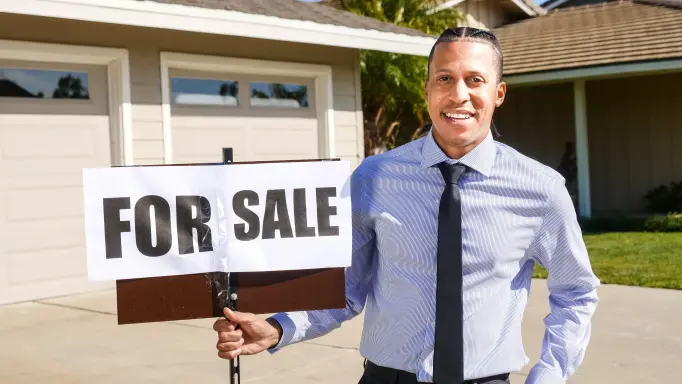Selling Parents House Before Death

Selling parents' house before death may seem disrespectful but more and more people are actually doing it to avoid major conflicts. If you're an heir to an estate, you might want to consider this, too, so you don't have to deal with probate and tax consequences later on.
It is not difficult to sell selling your parent's house before death granted that there aren't any liens on the property or any issues clouding the title. Selling the house would be like any typical home sale—it can be listed in the MLS or sold to a cash buyer. If you want a fast sale, the latter is your best option.
Thinking about selling parents home before their death? You landed on the right blog! Read the rest of this blog to prepare for the sale.
Can You Sell Your Parents House Before Their Death?

Yes. You can sell your parents house before death. In fact, it is more suggested than selling parents house after death where the estate has to go through probate. This has more tax benefits, too.
No laws prohibit the sale of a property before a parent's death; however, you must have the full consent of your parents before you list or get a fair cash offer.
Neither you nor anyone else has the right to put the house on sale during your parent's lifetime unless you have the power of attorney.
Is It Better to Sell a Parent's House Before or After Death?
It is indeed better to sell a house before a parents death than after; that is why many heirs are going this route. But to better establish this viewpoint, let us look at the process of selling a house after death.
Selling a House After a Parent's Death

Selling an estate after a parent's death is quite difficult because you have to do it while dealing with grief. The process is very technical and if you aren't in the right mind, you may overlook some details.
Here are the most crucial steps when selling a parents house after death:
Identify the Status of The Property
Before doing any actions, you first have to identify if you have the legal right to sell the estate of your deceased parent. This is often overlooked with family members consumed by grief. Inheriting property from your parents can happen in three ways:
- Probate: If the parents pass the property through a will, the estate has to go through probate. This is also inevitable if your parents did not leave a will so the right people are granted legal rights to the inherited property. Probate is court-supervised and it ensures that your parents' debts are paid before the inheritance is divided among the heirs.
- Death Deed or Transfer: You can inherit your parent's estate directly if they left a beneficiary deed. You can avoid probate and you can proceed with the sale of the inherited property without going to court. Note, however, that a death deed is only valid in some states and you still have to pay taxes if you inherit an estate through this.
- Living Trust: A living trust contains detailed directions on how the assets of the parents should be distributed after death to avoid probate. The parents serve as the grantor and a trustee (usually a family member) is assigned to oversee the whole process of distribution to the beneficiaries. This also bypasses the whole probate process when you sell the inherited house.
Establish Who's the Will Executor and Notify All Heirs
Just because you are an heir to the property doesn't mean you have the right to decide for the other beneficiaries. A will typically designates an executor or personal representative from the family members. But if no one was appointed, the court will assign one during probate.
The will executor will then call the shots regarding the home sale. But aside from facilitating the sale and communicating with the family members, the executor should also notify the creditors of the parents and pay them with the sale proceeds.
Address Disagreements
With the parents gone, conflicts can easily arise among the heirs, especially if some of them have unrealistic expectations regarding the selling price or they harbor emotional attachments to the property. This should be addressed immediately so they don't turn into full-blown disputes.

All the heirs should sit down and discuss who's going to prep the parents house for sale, who will fund the sale expenses, how the proceeds will be split, and some other points of conflict. A professional mediator may be necessary during this meeting.
Decide How to Sell
Deciding on a way to sell the inherited home should also be discussed among the heirs. There are three major options when selling your parent's house after death— work with a local real estate agent or real estate broker who knows the probate process, get a cash offer, or sell FSBO.
Understand Capital Gains Tax and Other Home Sale Tax Implications
The sale of an estate after the death of a parent is also taxed by the government. There are three major taxes that come into play when you sell a deceased parents home.
- Inheritance Taxes: An inheritance tax is a state tax that you pay to the state from the money you get on the sale of a parent's estate.
- Estate Taxes: Estate tax is a federal tax taken against the fair market value of your parent's house. Estate tax is paid before the proceeds are distributed to the beneficiaries.
- Capital Gains Tax: Capital gains taxes are taken against the difference between how much your parents bought the house and the amount it is sold after their death.
Report the Sale to the IRS
Given that the sale of a parent's estate is taxable, it should be reported to the IRS. You can learn more about this by checking out this page.
Tax Implications of Selling Parents' House Before Death

As established in the previous section, you have to pay inheritance, estate, and capital gains tax when selling your parent's house after death. These can all be avoided if you sell the house before they pass.
Generally, your parents won't have to pay capital gains tax if they sell the house by themselves and they meet some criteria. They would get as much money as possible from the sale and they can then gift it to you tax free.
No Need to Pay Capital Gains Taxes
A $250,000 to $500,000 tax exclusion will be granted to your parents if:
- The house they sold is their primary residence. In other words, the property is not a vacation home.
- They owned the house for more than two years before selling it within the 5 year period.
- They lived in the house for at least two years before selling it within the 5 year period.
Important note: Individuals who are away from home because they are part of a foreign service or the military can still get a tax break.
If your parent is single, they can get a tax break of up to $250,00, meanwhile, if they are married and filing jointly, they can be granted up to $500,000 tax exclusion.
To illustrate, if the marital home was bought at $300,000 30 years ago and your parents sell it today for $900,000, they would earn $600,000 from the sale. If they file jointly, the $500,000 won't be taxed.
On another note, if one parent already died, the surviving parent can still get a $500,000 break from capital gains tax if they sell the house within two years from the death of the spouse.
Gift Tax
After the house is sold by the parents, they can then gift the proceeds to their children to avoid taxes.
The amount of tax-free money that can be gifted to the heir each year is $15,000. This limit is per person and can also be gifted to the heir's spouse.
For example, if the proceeds of the estate sale are $450,000 and there are three heirs and each has a spouse, the parents can gift $15,000 to all six individuals in a year without having to pay taxes.
That means, the parents would be gifting $90,000 in the span of five years and it is tax-free.
Aside from gifting and availing a tax break, there are also other ways to avoid paying taxes when passing the money to the beneficiaries. It is best to consult a real estate attorney (elder law attorney) or a CPA to explore all your options and prevent unintended consequences.
Inheritance Tax
Properties are exempt from inheritance taxes if their fair market value is below $11.18 million. This is inevitable for very large estates.
But the good thing is only 2 out of 1,000 face inheritance tax according to the Center on Budget and Policy Priorities.
How to Sell Parents' House Before Death

Selling parent's house before death is similar to typical home sales. There's no probate process that the estate has to go through and there's far fewer complications because the parents are still around to make decisions.
Having said that, you can sell a parent's house in two major ways—getting a cash offer or selling with a local real estate agent. Let's compare these two options so you can choose which works best for you.
Sell to a Cash Buyer
Selling your parent's house to a cash buyer before death is the route taken by many to avoid all the hassles of a traditional sale.
A cash buyer can pay with cash, unlike retail buyers who need to borrow from a lender to buy your home.

According to the National Association of Realtors (NAR), cash sales have risen by 25% in 2021. Many of the houses bought were primary residences or houses owned by couples and parents.
This makes sense since many parents are already old when they decide to sell. They're looking for an effortless way to make a profit out of their property and quick sale companies or cash buyers offer exactly that.
Here are some more reasons why homeowners prioritize cash buyers when selling their property:
- Faster Sale: Cash sales are relatively faster than traditional home sales because there's no mortgage lender involved. If your parents want to gift you the proceeds immediately, they can do so.
- Less Risky: Since lenders are eliminated from the picture, there's little to no possibility that the sale would fall through. In the local housing market, some home sales were unsuccessful because lenders do not approve of the loan.
- Flexible Sales Timeline: If your parents want to close the sale in a week's time or in six months, it is possible. Cash sales offer flexibility because again, there's no lender that dictates the release of money to buy the property.
- No Closing Costs: In a typical sale, closing costs are around 2% to 5% of the home's purchase price. This amount is covered by the cash buyer or investor if you opt for a cash sale.
- No Commissions: There is no need for a real estate agent when selling your parent's house for cash. Agents are only helpful when you are selling property in the traditional way. And since no agent is needed in a cash sale, there are also no commission fees.
- Less Paperwork: Selling an inherited house to cash buyers means less paperwork because there are no mortgage loans needed. Usually, mortgage loan applications make traditional sales heavy with paperwork because there are a lot of requirements before the loan is granted.
- Less Work: When you get a cash offer, you skip all the necessary steps of a traditional sale like marketing your house, listing, showing, etc. You just wait for the estate sale to close and for the money to be transferred to your bank.
- No Lengthy Negotiations: Since you are only transacting with a single cash buyer, there are no lengthy negotiations. You won't get stressed dealing with many prospective buyers who want to buy your house for a very low price.
- No Home Repairs Needed: If your parent's property requires extensive repairs, it may be really difficult for them to make repairs given their age. Luckily, cash buyers don't require home repairs. They buy houses as-is no matter the condition.
- No Appraisal: Professional appraisals can be very expensive. The good thing is, cash buyers won't require an appraisal report for your inherited property.
- Easy to Pass Inspection: When a cash buyer visits your property to inspect, it won't be like a professional home inspection paid for by a traditional buyer. Cash buyers are less stringent and the results of their inspection won't cause the fall of an estate sale.
- Odd Layouts Are Accepted: Old houses usually have odd layouts which is why they are harder to sell in the local housing market. Cash buyers buy houses no matter how weird they look or how odd they are.
The greatest difference between a cash sale and a traditional sale is the speed at which your house can be sold. Cash sales are faster because it generally follows a 5 step process.
Request a Cash Offer
To get a cash offer, head over to the cash buyer's website and fill out a form. You can also call them on the given number on their page.
Home Walkthrough
The cash buyer would pay you a visit to inspect your home. This is done so they can formulate an accurate offer.
Typically, this is only done once so if you are uncomfortable opening up to anyone, it won't be a problem.
Communicate a Move Out and Closing Date
As mentioned earlier, you have full control over the sale's timeline. Just inform the cash buyer when you plan to move and close and they can adjust the schedule for you.
Review and Sign the Contract
Once you have agreed on an offer, the cash buyer would electronically send a contract that you have to review and sign.
During this time, you are free to ask questions regarding the terms. After signing, you just send it back to the cash buyer.
Closing
The sale would close at the date you set if there are no clouds in the title and there aren't any other legal issues connected to the property.
Once the deed is transferred to the cash buyer's name, you'll get the money in the bank.
Sell With a Real Estate Agent

Since the parents are alive and the house doesn't have to go through probate court, selling with a real estate agent is also an option.
This route is for people who want to get more money out of their property. This is also the better option if the seller is not in a rush and there are no major damages or repairs that the house needs.
Here are the steps when selling your parent's house traditionally:
Hire a Real Estate Agent
Find an agent who knows the real estate world well. Prioritize agents who have already sold similar houses in your area or those with good reputations.
Get a Pre-Sale Home Inspection
A pre-sale home inspection will help you identify the issues or damages of your parent's home that can be the basis of repairs. Getting a pre-sale inspection would avoid buyers from using the damages or issues as their bargaining card.
Make Repairs and Stage your parents Home
Once you get the inspection report, it's time to make repairs. Prioritize repairs that would add value to your parents home. If the house doesn't have major issues, you can still make aesthetic improvements to attract more buyers.
Take Professional Photos
Clear, professional photos of the house should not be underestimated since they are the initial basis of whether the buyer will read your listing or not.
Take super clear photos and make sure every great area of your house is highlighted.
List Your House in the Market
Your agent is responsible for listing your house in the local MLS. However, you should work with them to create an accurate and interesting listing description as well as set a good asking price— one that is not too high nor too low.
Schedule Open Houses and Showings
If you want more people to take interest in your property, make time for open houses and showings.
An open house is when you allow the public to look at your property. While a showing is a private tour.
Negotiate Offers
Once the offers have come in, you should review them with your agent. In most cases, your agent would negotiate for you. But there are some instances when you really have to be involved, especially if you're selling the house as-is and all the offers are quite low.
Gather All Necessary Paperwork
There's a lot of paperwork during closing. You must prepare all legal documents to prevent delays.
Some of these are the purchase contract, property survey, tax records, mortgage documents, appraisal reports, inspection reports, and home insurance.
Close on the Sale
If most of the documents were already signed prior to closing, the seller may choose not to attend and send an estate attorney instead.
But if the property is attached to a debt, the closing could take a while longer because your parents still have to pay what they owe before they can get the money they'll gift to you.
Related Questions
Do All Heirs Have to Agree to Sell Property?
Yes. In the case of multiple heirs, they all have to agree to sell a property before a sale can proceed. But if there is a major disagreement or conflict, a sibling can still force a sale through a partition lawsuit. This requests the court to end or terminate the co-ownership of a house so the sale can commence.
The one who will force the sale can sue for custody or full ownership of the property. This is a very complicated process— there would be multiple hearings and evidence and testimonies will be needed.
The sibling who filed the lawsuit would also need to hire a referee, an accountant, and an attorney, so it's really better if everyone agrees on the sale.
Can You Sell Your Parent's Home if You Have the Power of Attorney?
Technically, a child with the correct form of power of attorney can sell his parent's home to settle medical bills and provide for the needs of the parent.
The power of attorney gives the child the right to make specific decisions on behalf of the parent while the latter is alive. The child becomes the attorney-in-fact and their parents become the principal.
Note that if the principal or the parents pass, the attorney-in-fact loses powers. This means, a child would no longer be able to sell their parent's home if they decide to. The house would go through the probate court and an executor would decide what will be the next move.
Final Thoughts: Selling Parents House Before Death
Selling a parent's house before death may be frowned upon by many, but it is a great way to avoid capital gains tax and other taxes related to an inheritance. Although the heirs won't immediately receive the exact full amount their parents are meant to give them, they would still get all of it in a few years' time.
If you have decided to sell your parent's house fast or you're a parent who wants to spare your child from expensive taxes, now is the right time to sell to get a cash offer.
Make sure to reach out to us at House Buyer Network to get the best no-obligation cash offer. We'll help you sell your house fast and we'll also cover the closing costs for you.
Call us at (855) 835-2544 or fill out our form below to start selling your house.

